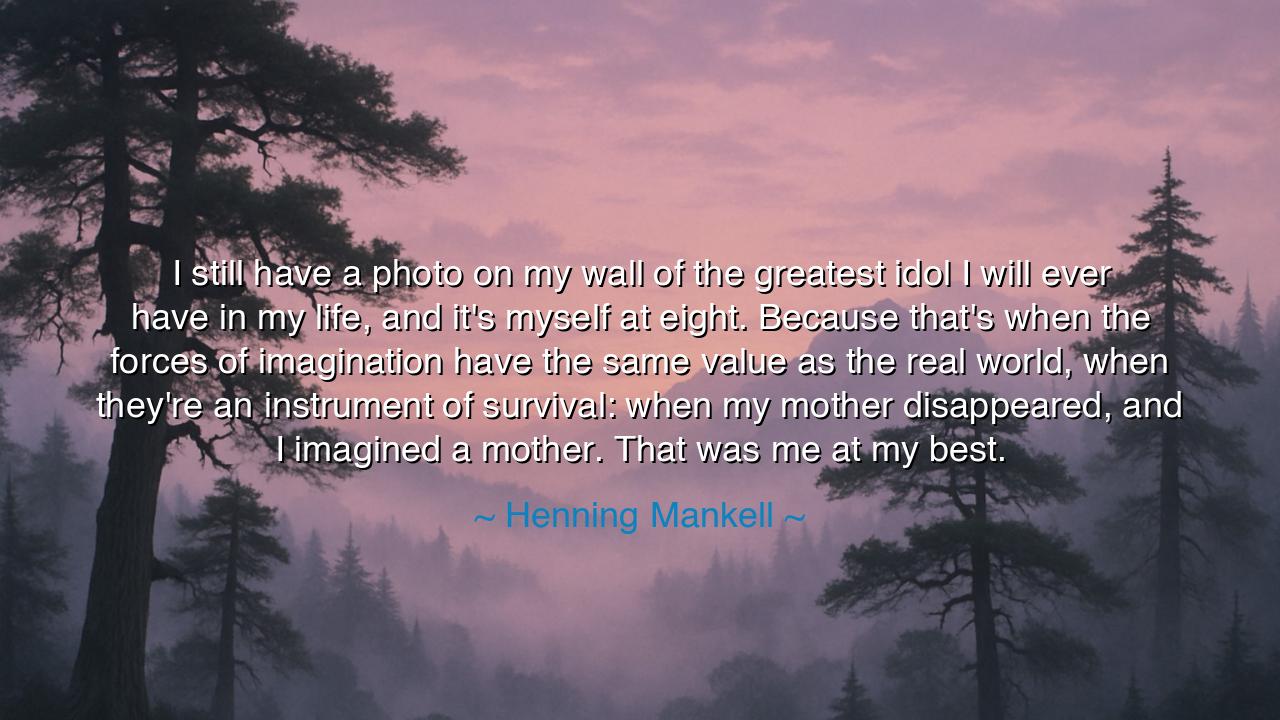
I still have a photo on my wall of the greatest idol I will ever
I still have a photo on my wall of the greatest idol I will ever have in my life, and it's myself at eight. Because that's when the forces of imagination have the same value as the real world, when they're an instrument of survival: when my mother disappeared, and I imagined a mother. That was me at my best.






“I still have a photo on my wall of the greatest idol I will ever have in my life, and it's myself at eight. Because that's when the forces of imagination have the same value as the real world, when they're an instrument of survival: when my mother disappeared, and I imagined a mother. That was me at my best.” Thus spoke Henning Mankell, the storyteller of shadows and souls, whose words pierce like the quiet sorrow of memory. In this confession lies not vanity, but reverence — reverence for the child he once was, and for the holy power of imagination that kept him alive when love was gone. He speaks of that age when imagination and reality still share equal weight, when the mind, unbroken by reason, can conjure comfort from the void.
To idolize one’s childhood self is no common thing. Most men look back and see only innocence or foolishness, but Mankell saw something divine — a fragment of purity, courage, and creation. At eight, he faced a wound no child should bear: the disappearance of his mother, the vanishing of the heart’s first sanctuary. Yet where despair could have taken root, imagination rose like a guardian. He imagined a mother and, through that act, forged not illusion but survival. The imagination became his shield, his breath, his anchor in the storm. That, he says, was “me at my best” — not the acclaimed author, not the man of fame, but the child who refused to die within.
The ancients would have understood this deeply. For in the myths of every people, the child who suffers and dreams becomes the bearer of new worlds. Think of Orpheus, who lost his beloved and yet sang her back to life — for what is that but imagination overcoming the cruelty of absence? Think of the young Buddha, who saw suffering beneath the palace’s gold and envisioned compassion that could conquer pain. Or of Helen Keller, a child cut off from sound and sight, who through imagination and will learned to speak, to read, to live. Each, in their way, used the same divine instrument that Mankell honored — the power to remake the world from within when the outer one has crumbled.
Imagination, in Mankell’s vision, is not the luxury of dreamers. It is the first tool of survival, the sacred weapon of the human soul. When all else is taken — when the hand of comfort is gone, when the voice of love has vanished — the mind still holds the power to create what is missing. To imagine is to rebel against despair. The child’s imagined mother, though unreal, was real enough to carry him forward. It was love conjured from emptiness, a creation as potent as breath itself. Thus, the imagination becomes divine in purpose — a force equal to life, because it sustains life.
And yet, as we grow, we cast this power aside. The adult, proud of his logic, forgets the alchemy of the child. We begin to separate the real from the imagined, believing one to be truth and the other to be play. But Mankell’s words warn us that in doing so, we amputate half our soul. For what is art, what is hope, what is faith — if not the imagination of something not yet seen, but deeply needed? The child within him, and within each of us, knows that to imagine love is sometimes the only way to feel it, and to imagine light is sometimes the only way to find it.
Consider the painter Frida Kahlo, bedridden and broken after her accident, who painted herself again and again, not in vanity but in survival. Through imagination, she built a world where pain became color, and loneliness became art. Like Mankell’s child-self, she faced absence and answered it with creation. Her paintings were her imagined mother, her imagined comfort — the hand she could hold when no other hand could reach her. So it is with all who endure through imagination: they become their own saviors.
The lesson, then, is this: do not forget the child you once were. Honor them, for they hold the blueprint of your strength. When the world wounds you, call upon the imagination that once turned emptiness into meaning. Place their picture, as Mankell did, upon your wall — not as a relic of the past, but as a reminder of who you truly are when stripped of all else. The adult seeks escape; the child seeks creation. The adult fears illusion; the child transforms it into truth.
So remember, dear listener: the forces of imagination are not mere fantasy — they are the breath of the divine within the human. Let them live in you, not only in art, but in the way you love, the way you hope, the way you heal. For the world may take away comfort, certainty, and even love itself — but as long as your imagination endures, you will never be without light. Be, as Henning Mankell was, your own source of salvation. And when you look upon the child within you, say as he did: that was me at my best.






AAdministratorAdministrator
Welcome, honored guests. Please leave a comment, we will respond soon